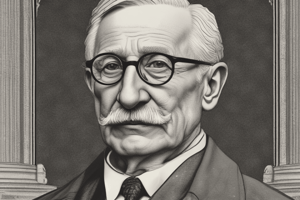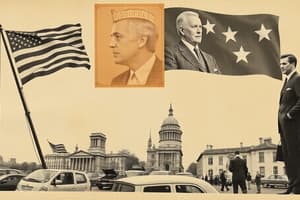Podcast
Questions and Answers
What does the first Law of Nature proposed by Hobbes emphasize?
What does the first Law of Nature proposed by Hobbes emphasize?
- The importance of wealth acquisition
- The necessity of individual freedom
- The rights to unlimited power
- The pursuit of peace (correct)
According to the concept of the Social Contract as described by Rousseau, what is the nature of this agreement?
According to the concept of the Social Contract as described by Rousseau, what is the nature of this agreement?
- A binding legal document signed by citizens
- An actual historical event in human history
- A set of religious doctrines that must be followed
- A metaphorical arrangement among free individuals (correct)
What is the primary obligation that arises from an individual's enjoyment of societal goods?
What is the primary obligation that arises from an individual's enjoyment of societal goods?
- To become a leader in the community
- To challenge government policies
- To advocate for individual freedoms
- To pay taxes and contribute to the system (correct)
What view did Rousseau hold about human nature in society?
What view did Rousseau hold about human nature in society?
What does Hobbes suggest about the rights of individuals in relation to achieving peace?
What does Hobbes suggest about the rights of individuals in relation to achieving peace?
What is the responsibility of a student who decides to cut class?
What is the responsibility of a student who decides to cut class?
According to the content, what distinguishes human beings from animals?
According to the content, what distinguishes human beings from animals?
What does divine law represent in relation to human and natural laws?
What does divine law represent in relation to human and natural laws?
What is Sartre's view on existence and essence?
What is Sartre's view on existence and essence?
What is the primary concern of natural and human laws?
What is the primary concern of natural and human laws?
How does a person become responsible for their life according to the content?
How does a person become responsible for their life according to the content?
What happens to actions that are deemed evil according to the principles discussed?
What happens to actions that are deemed evil according to the principles discussed?
In the example given, what does the mother's aspiration for her child represent?
In the example given, what does the mother's aspiration for her child represent?
What does political freedom primarily involve?
What does political freedom primarily involve?
Which political ideology emphasizes the government's role in protecting individual rights?
Which political ideology emphasizes the government's role in protecting individual rights?
According to the content, what are natural rights?
According to the content, what are natural rights?
What is a key belief of libertarianism regarding rights?
What is a key belief of libertarianism regarding rights?
What does the capability of an individual to act signify?
What does the capability of an individual to act signify?
Which type of freedom does socialism focus on?
Which type of freedom does socialism focus on?
How does Aristotle's view define the relationship between reason and will?
How does Aristotle's view define the relationship between reason and will?
What does freedom in a social context require from individuals?
What does freedom in a social context require from individuals?
Flashcards are hidden until you start studying
Study Notes
Freedom
- Freedom, in a social and political context, is the absence of oppression, compulsion, or coercion from individuals, authority figures, or society itself.
- Societies require people to surrender some freedoms to live harmoniously and ensure survival.
Political Freedom
- Consists of two types of liberties:
- Freedom from: Being free from external restraints, barriers, and interference from others.
- Freedom to: Taking control of one's life and fulfilling one's potential.
- Political ideologies address human liberty:
- Liberalism: Upholds individual rights and emphasizes government protection of these rights.
- Libertarianism: Believes individuals, not the government, are best suited to upholding and exercising rights.
- Socialism: Considers freedom as the ability to acquire economic resources, work, and act according to one's desires.
- Freedom encompasses recognized rights and entitlements:
- Natural rights: Inherent rights, such as the right to life, considered universal and inalienable.
- Legal rights: Rights based on societal customs and laws, enacted by legislation and enforced by a government.
Free Will
- Philosophers define freedom as based on free will, the capacity to choose actions and decisions.
- Free will should be based on sound judgment and rational thinking.
- Aristotle believed humans are rational, with reason being a divine characteristic.
- Reason can legislate, but will is necessary to turn legislation into action.
- Will is an instrument of free choice.
Responsibility
- Individuals have the capability to act and manage their behavior.
- Consequences follow actions, and individuals must be held responsible.
- Humans have the distinctive power to alter themselves and their surroundings.
- Spirituality separates humans from animals and allows for conscience.
- The choice to be "good" or "evil" is a personal responsibility.
Law
- Rational human beings have laws that should be obeyed voluntarily and with understanding.
- Laws can be categorized as:
- Eternal Law: Applies to all created things, governed by God's laws.
- Divine Law: Revealed through scriptures and religious teachings.
- Natural Law: Applies only to humans, based on inherent goodness and the avoidance of evil.
- Human Law: Established by human societies to regulate behavior and order society.
Natural and Human Law
- Both focus on ends determined by human nature.
- Humans are ordained to an end that transcends nature, requiring a divine law for guidance.
Existentialism
- Sartre's existentialism states "existence precedes essence."
- Emphasizes the importance of free individual choice, regardless of external influences.
- To be human is to be liberated to imagine, choose freely, and be responsible for one's life.
- Individuals create their own destiny.
Cooperation
- Free, rational, self-interested people recognize the benefits of cooperation.
- Rights imply obligations, requiring individuals to contribute to the common good.
- This is exemplified by paying taxes to support services like security.
Hobbes' Law of Nature
- The preservation of one's own life is paramount.
- Avoidance of things that cause destruction to humans is essential.
- Peace is necessary for survival and for contracts that form the basis of moral obligation.
- Laws of Nature:
- 1st: Seek peace.
- 2nd: Mutually divest rights to achieve peace.
- 3rd: Fulfill agreements.
Rousseau's Social Contract
- Human beings are born free and good, but become corrupted by society, civilization, and progress.
- The "Social Contract" is a philosophical concept, not a historical event.
- It represents a society of voluntarily collected individuals, living harmoniously through mutual agreement.
Studying That Suits You
Use AI to generate personalized quizzes and flashcards to suit your learning preferences.




